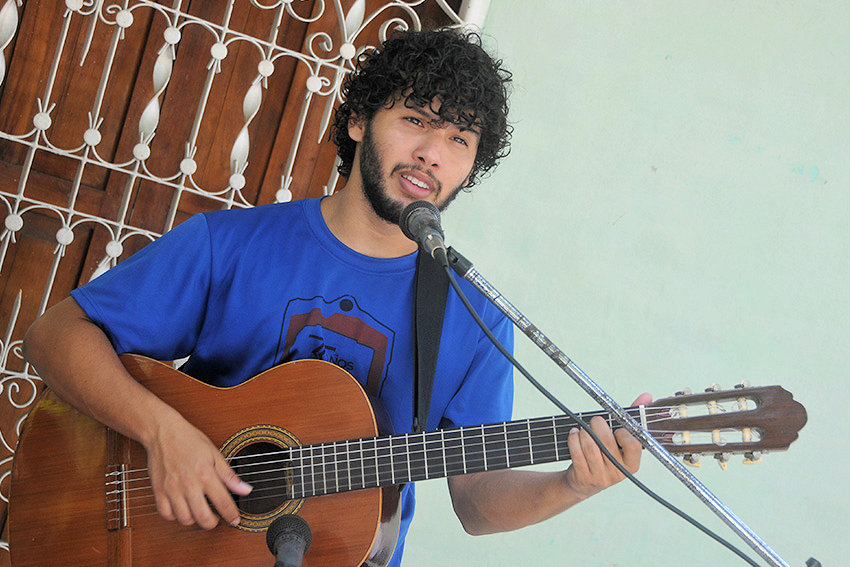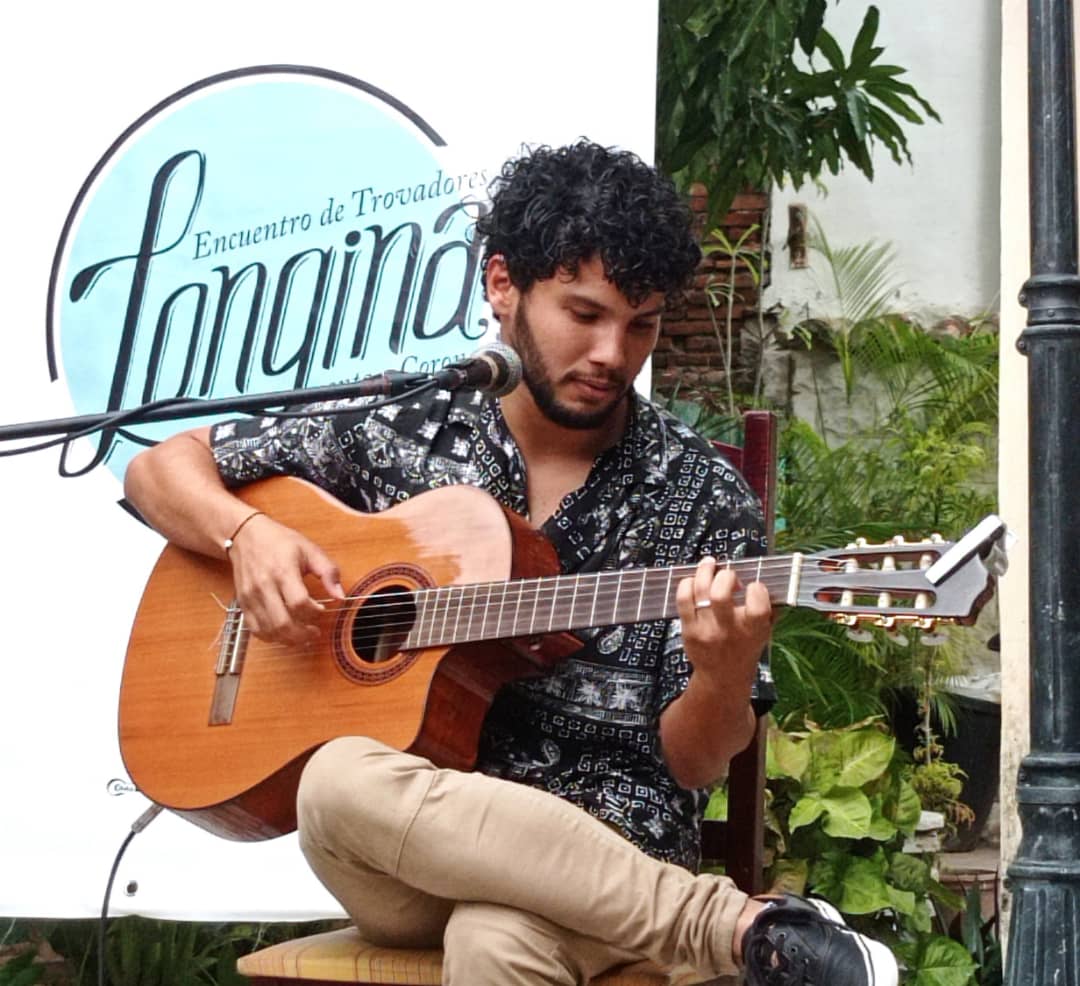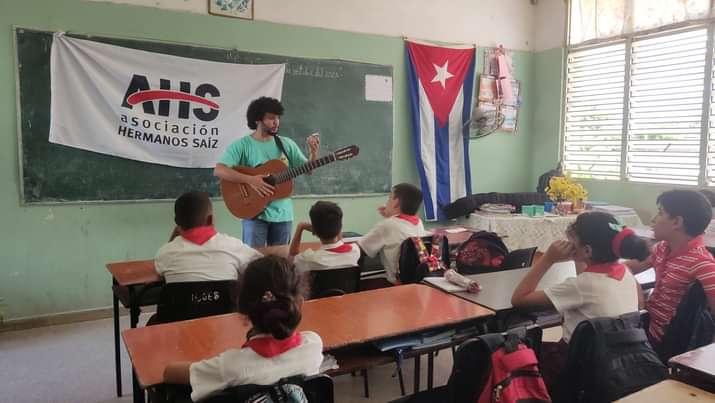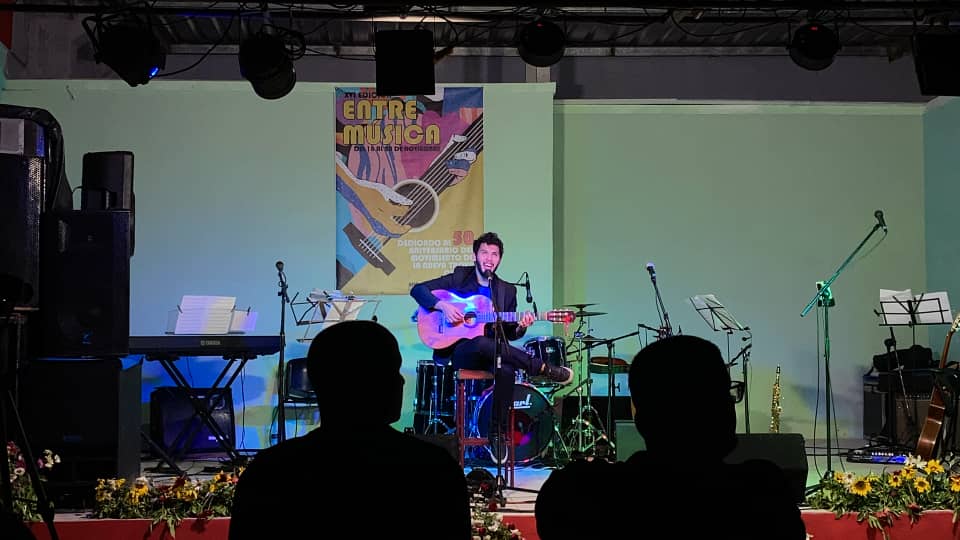
Behind his voice, we discover a restless young man, with a passionate heart and a good soul, who likes to share - through songs - the poetry with which he looks at the universe. Jesús Ricardo Pérez Cecilia, vice-president of the Hermanos Saíz Association (AHS in Spanish) in the province, is one of those luminous beings who, with guitar in tow, steeps his kite of dreams, even in times of grey clouds and hurricane-force winds. Nothing stops him.
The Longina troubadours' meeting is his most recent experience, the one that makes him fall in love again with Remedios and other places in the center of the country. As he is always willing to dialogue and converge, he contributes to this medium to share his worldview, life story, and some reasons for inspiration, those "pieces of rain" that flood his existence.
STORY OF THE THREADS

"I was an immensely happy child, begins Chuchín, as he is called. My mother (Lesvia Cecilia Borrego) and my grandmother (Elia Borrego Velázquez, deceased) were very supportive and encouraged my artistic interests. Since then I liked singing, but also acting and drawing. I even had a guitar, although I didn't know how to play it. They took me to the theatre and I participated in Cucalambeanas, matinees, and other activities. I was already inclined towards art."
"But... How did I get into Trova? Well, I grew up while discovering reggaeton and I didn't feel identified with that music, even though it was what my friends and society in general were looking for. Let's say, Don Omar, Daddy Yankee..., although I still didn't know Trova."
"Growing up, I understood the phenomenon of the singer-songwriter, something that absorbed my heart. And even though I studied acting, I was always close to that kind of sound. I liked the different and poetic way of telling stories and communicating feelings. So, little by little I discovered authors like Carlos Varela, Nelson Valdés, Ivette Cepeda.... And I started to get into that world but as an amateur. At the same time, I began to make songs, trying to identify my reality with the poetry I had inside me."
"Nothing from a musical point of view makes me vibrate as much as trova songs. That happens to me even with some that I've never heard of before. I feel that the soul is lifted. So one day I said to myself: 'That's what I want to do."
"First there was the performing arts. I'll tell you... In 2012 I started studying acting and finished in 2016. From my third year, I got involved with Teatro Tuyo and I was under its umbrella from 2015 to 2019. It all started one day when I went to talk to Ernesto Parra. I was one of those kids from the Buena Vista neighborhood who went to see the plays at his Cultural Centre and I grew up with them. That's why I thought about doing my graduation exercise with that group. And so I did. I graduated with two plays and the maximum qualification. Papote, Clotilde Aguillón, and other members of the group always accompanied me."
"With Teatro Tuyo I realized what it means to be an artist. Being an artist is not a title, not a medal or recognition. There I learned that effort is a daily effort and that, in life, the important thing is to find those spaces in which you are happy."
"But, at some point, I had to choose between theatre and music. I confess that it was a complicated stage, in which several people talked to me about staying in the theatre, but in the end, my decision was the right one, because every second was worth it. However, as coincidence would have it, the 50th Anniversary Commemorative Medal of the Nueva Trova was awarded to me at the Teatro Tuyo cultural center, in the context of Luna Creciente. That was a commitment and a tremendous joy."
WHITE HORIZONS

"What is trova, you ask me. And I answer that it is not a genre, as is sometimes thought, but a style, a way of making songs. We have examples like Matamoros, who was a great sonero and also a troubadour; Santiago Feliú, who was a rocker, or Varela, the latter closer to Anglo or English genres, but they are troubadours. Trova is much more than that, it includes the conga, the ballad, the sucu-sucu, and fusion... it is a style of understanding the song from a musical, poetic, narrative, and essential point of view."
"At the Escuela Profesional de Arte, I studied acting, but I had many friends who were musicians, and even my girlfriend at the time was a musician. Besides, I was a bit embarrassed to sing in public. In the Military Service things changed and I had free time, at least in my mind. And I, being a very spiritual person and needing to keep my inner spark alive, told my mum to bring me the guitar. So, even though I knew few chords, songs started to come out about the things I believed and lived."
"It was a real effervescence. I listened to Nelson Valdés, Santiago Feliú, and others; I went to trova peñas; I listened to Freddy Laffita, Daniel Velázquez and I got close to the troubadours of Trovuntivitis. I identified with all that; it was a truth that was in me and needed to come out somehow. However, I still didn't have much knowledge, besides, I was beginning to make songs with musical ideas that were beyond my physical and cognitive possibilities, for example, there were chords that I didn't know how to play. So, little by little, I got closer to musicians, writers, and the AHS, the last point of my contact with trova and the first in my career as a troubadour."
"The AHS is a very important platform for young artists to get support for our work. This institution gave me the possibility to do the Luna Creciente project. Today, from the point of view of my re-election as vice-president of the AHS in the territory, I am flattered, because people have put their trust in me. However, I feel that there is still a long way to go before the organization and young art in Las Tunas and Cuba resemble the dreams that these people, lacking spirituality and so many other things, need. As the Saíz brothers say: 'We have a life and an immense work to do'."
GROWING MOON

"Luna Creciente is the most important project of my life from a professional point of view to date, I confess. I became a member of the AHS for Performing Arts on 10 April 2019, at a time when I was a member of Teatro Tuyo, and, on 30 May of the same year, I did the first Luna Creciente peña. I also became a member of the Guild for Music, in other words, I have a double membership in the youth artistic vanguard."
"What was the motivation behind this initiative? Being a group of young people who always wanted to show their art, so that it would be visible and could develop further. Ernesto Parra taught us that there is no better school than life and work. The best way for an artist to develop is to work, confronting himself day by day with the artistic facts, with the public, with mistakes and victories."
"That's why Luna... is my strength. It has brought me many joys and fruits. The first is to develop myself. Today I feel that I am bigger from a professional point of view. I have also managed to make the work of several young people known. As well as merging the space with others that have nothing to do with it, such as approaching children, the performing arts, radio... Normally it is linked to trova, to poetry, but there are other possible connections. Music is in everything."
"You ask me about promotion, about this 'sweet obsession' of mine to talk about Luna Creciente over and over again. Well, social networks have been very important allies. Thanks to them I have managed to get my work known, which has opened doors for me to participate in events. Promotions are an alternative that I found to get closer to other audiences so that the work of the AHS and songs made by young people can be seen with different eyes, so that they can see that I'm a young person just like anyone else, but with projects. This has helped me a lot in terms of social exchange, which is very necessary for creation."
"Very funny things have happened to me like some people believing that I have studied this and even companies have written to me asking me to help them with marketing campaigns, food companies, MSMEs.... But I tell them no because I respect that work very much. It's just something I do empirically to promote my work."
"On the other hand, I use the moon as a symbol, because it is a beautiful example of vindication and human beings need to learn a lot from that. Cycles end and others begin. Life begins every day. My daughter's name is Eva Luna (after her mother's ingenious name) and my club is Luna Creciente (Crescent Moon), a name I came up with one day, just like that. Now I also have the project Semillas de Luna (Moon Seeds), with which I go to schools and reach out to the community. There is something mystical about these appearances of moons in my life."
EVA LUNA
"Yes, I became a father very young. Luna is already 10 springs old. I had her when I was 16 years old, I was just a child, without maturity of any kind. That was a change, a mental, psychological, and emotional transformation. Thanks to the support of my family, of Lily - Luna's mum - I coped as well as I could. I always wanted to be a father, it just came much sooner than I expected. But when it came I accepted it and I fell in love with the idea, because Luna is also wonderful, a child with a lot of light."
"And, of course, she has influenced my art. When you have the responsibility of carrying another life, it implants more sensitivity in the heart. I, who have always been a sensitive person, have become more so since I became a father. Now I understand the importance of childhood, of listening to children. All this translates into my songs, although it may not seem like it, because adults are children who have followed a path. We carry our frustrations, our longings, our victories... Being a father has been the best way to understand this and to translate these teachings into my work."
IMMENSITY
"My creative process is very diverse. The songs are born when they want to be. I've never practiced a specific way of making the song. Sometimes the music comes first, sometimes the lyrics, or a piece of melody, or the whole song. Making songs is the ultimate. I even like to make them to order. One of my dreams is to make music that has functionality for Film, Radio, and other platforms. That's why I was so happy when my songs were used in Radio Victoria's Motivos series."
"Songs are something mysterious, the imagination is always active and inspiration often comes when I'm walking, almost always unexpectedly. I feel identified with all my songs. Each one has its moment, they all compose me and I love them all equally, regardless of their characteristics. I've never thought of a formula for making them. I simply make them."
"In this process, nature is always present. I love its peace, energy, and power. Art is timeless, it is not confined to a specific situation, and it can be made in different spaces and for different audiences. Nature is a great teacher in that sense. It teaches us that, after the darkest night, there comes a dawn. There is always a natural form in which to take refuge from our pains. Nature is part of my art and me."
SONG FOR A SUNFLOWER
"My conceptions of art? I don't defend the idea that art is for artists. Art is for everyone. Nor do I believe that there is one art that is more intelligent than another. Although I do believe that every artist should be authentic. Influences are important, and it is important to drink from good and bad sources to learn, but there is nothing like being authentic, like bringing your truth, in the way that only you can do it."
"The audience is also a teacher. The themes and the way you approach your work initially come from your sensitivity, your capacity, and your experience. Love is the most universal theme, but also - in my opinion - the most necessary. It is the most valuable thing to show people the right path for human development. There is so much evil in the world that to sing of love from good is surprisingly irreverent and visionary."
"Poetry comes in these forms, in not prostituting itself to the commercial, in not copying what is most abundant... I prefer to do something that hasn't been done so that I can contribute. Even my songs deal with love, heartbreak, or specific topics such as migration, even about people I admire such as Martí and others."
"Something that should not be missing in our dialogue: my friends are an essential pillar in my life and career. Without them, I wouldn't be remotely the artist I am today. I thank them all, those who started Luna Creciente with me, the guys from the project El Manuscrito Perdido, the troubadours, and other people who have supported me. On many occasions, they have been the engine, the strength I need to keep going. In general, I'm a happy person, very peaceful, consistent with what I feel and think. And my world is my songs."
PIECE OF RAIN
"We artists are - to a certain extent - the measurers of what makes us different as human beings, as a species. We are the makers of culture, the ones who guide the cultural development of the world. That is a great responsibility. One has a position from which one exercises a conscious and unconscious influence on a group of people such as your family, your friends, and the people who follow you..."
"When making art it is important to understand that you are also a social, cultural, and historical phenomenon. It is important to understand that, because a word, a gesture, a criterion, or an attitude towards life, influences - in some way - others. We are builders of the future."
"That's why feedback is fundamental. You can always learn from others. And not only from the masters but also from those who are just starting. Creating culture is something that unites us. With the guys from the Cucalambé literary workshop, for example, I once talked about poetry for song and it was wonderful. We talked about mechanisms, about ethical and aesthetic questions to be taken into account. On another occasion, I gave a concert at the Luis Urquiza Jorge Vocational Pre-university Institute of Exact Sciences (IPVCE, in Spanish) and it was very well received. This gave rise to the idea of touring different schools. In the future, I even want it to go beyond the province and reach larger dimensions."
"The events throughout the country, for their part, allow us young people to exchange with people who have more experience, which is something we are grateful for. This has helped me a lot to know where my work is at, how much I have achieved, and what I still need to do. That feedback helps a lot."
"Art in the community is also fundamental. In these times, in which sometimes the institutions and spaces designed for art are not the most frequented or visited, it is an artistic responsibility to bring - as far as possible - art closer to the community. Art belongs to the community because an artist does not exist without the public, without society. This is urgent and indispensable. At the Ipvce I saw kids dancing to reggaeton, then they sat down to listen to my songs and made very nice comments."
"That's why I tell you that there are young people who are interested in trova when they get to know it. Young people can't be interested in something they don't know. But we still have a long way to go to fully comply with Cuban cultural policy, so that other genres or styles have the same diffusion as, for example, urban genres."
"I've seen kids dance to a reggaeton and then listen to a trova song and tears come to their eyes. And they comment on it and come to the peñas... That satisfies me, but it also commits me to give something extra in my work for the transformation we need, because if they don't know about trova, there's no way they'll come. We have to make them understand that we are not a herd and that we can choose the best. The singer-songwriter's song is something alive, something that breathes, something great, that doesn't go out of fashion. That song does not die."
THE MISSING SONG
"The artist I want to become? That has changed along the way, but what I won't change is to be sincere with what I feel, think, and live. And the other thing is that my work can be of use to someone. Beyond that, I don't expect anything else."
"As for the voice, it's a problem of each person, something that you get to know little by little. I enjoy this experience of self-improvement. I don't follow many singers who have a beautiful voice, my favorites are Sabina, and Silvio Rodríguez..., people who don't have a voice similar to mine. That's a bit of a contrast. However, I do take care of my voice, I don't like to smoke or do anything that affects it."
"Now, from the point of view of the lyrics, I've always been in love with poetry. I don't look for complicated words, but I do believe that the idea can be more effective if it comes from the soul, through the soul. My voice is a positive tool. If you find a way to make the songs shine with your voice, all the better."
"The most beautiful thing that can happen to you is that the audience is moved. I remember the first time I sang one of my songs and one person burst into tears. It's in those moments when you realize that what you do has meaning, a value that goes beyond the self. It's wonderful to discover that someone has dedicated one of your songs to someone else or says: 'That song has changed me'. Art goes beyond ourselves..."
I didn't need a conventional interview to get close to this young man. Poetry and spirituality emanate from him in the form of words. Jesús Ricardo Pérez Cecilia is simply "a thief of moments", as Silvio Rodríguez defined the artist. For him - as he said a few years ago on the television program Con Música -: "The horizon is a blank piece of paper and we are going to write it with all our will to walk."





